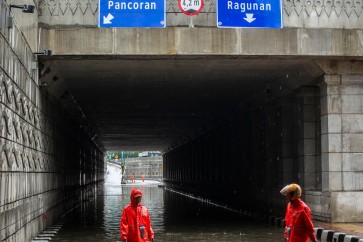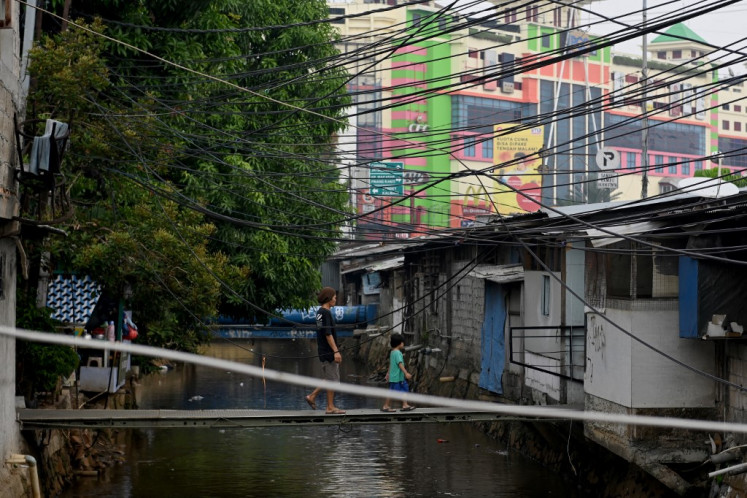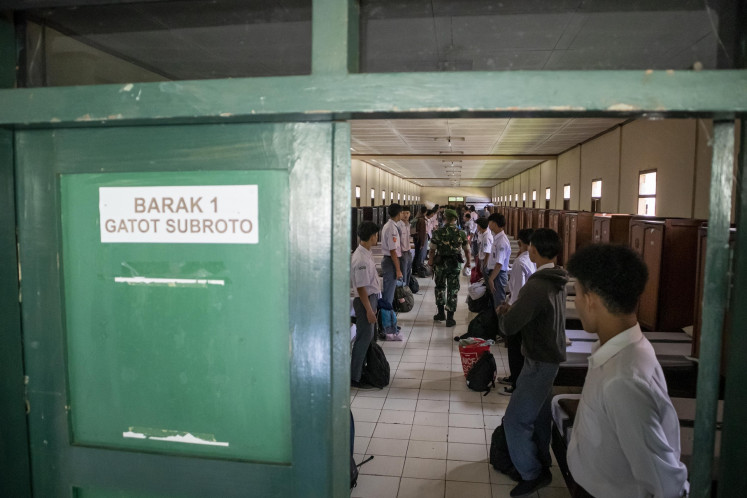Indonesia's fuel subsidy monster: The root problems
With upcoming elections and a drooping currency, the fuel subsidy issue will soon enough rear its ugly head
Change text size
Gift Premium Articles
to Anyone

W
ith upcoming elections and a drooping currency, the fuel subsidy issue will soon enough rear its ugly head.
Right now, a liter of Premium bensin (low-octane gasoline) at Pertamina sells for Rp 6,500 (55 US cents) and automotive diesel oil for Rp 5,500. Unsubsidized fuels are based on market prices that are in excess of Rp 10,000.
The government has apparently launched a preemptive attack on fuel subsidies, yet while there are many conflicting signs of what can and cannot be subsidized, enforcement is possibly lax. No one is willing to take a heavy hand with the fuel subsidy issue before the election, but the markets will force them to do so after.
Most of the remedies proposed and written about unfortunately are and have been all tactical (targeted cash transfers, reducing or fixing the subsidy) and not structural (bad roads, smuggling, bottlenecked traffic jams, flooding, etc) and therefore not politically strategic. Energy usage and consumption requires a rethink, yet this is not possible when perpetuating the same system over and over again.
That being said, all Indonesian economic activities, from cheap discount flights to Bali, to buses, trucks and cars on the Jasa Marga toll roads to the gridlock in Sudirman and Blok M, to ojek (motorcycle taxis), to container ports in Surabaya and the electricity generated by the state power monopoly PT PLN, are predicated on the availability and low costs of subsidized fuels.
Unfortunately, all subsidy reform to date ' as studies by the likes of the World Bank and International Monetary Fund (IMF) show ' has only discussed a strategy for raising prices on the consumer.
A 2012 updated International Institute for Sustainable Development (IISD) study titled A Citizens' Guide to Energy Subsidies in Indonesia, mentions a problem with hidden producer subsidies (such as tax incentives, investment credits and domestic market obligations), but goes on to mostly indict the consumer as the largest culprit.
The study does acknowledge that hidden producer subsidies are just too difficult to pursue. So that is the entire strategy: Ignore deeper issues and stick it to the consumer as 'the rich' may benefit unjustly.
Yet China, under the authoritative state-owned guise, isn't particularly worried about costs and 'rich vs. poor'. What it needs are products and its citizens to use those product to keep the economy churning.
The Chinese export machine and economy are highly predicated on oil and coal. This is why pollution is so bad in Beijing and other big cities in China. That won't change anytime soon. The currency is also tightly controlled at an artificially low value to keep competitive with every other Asian country, though labor costs have risen.
Despite the smog and ever increasing traffic jams, no one really complains about China subsidizing fuel. It appears China is being let off the hook as it is the 'factory to the world' yet Indonesia's subsidy is roundly criticized? Why is that?
Bank Indonesia (BI) Deputy Governor Perry Warjiyo predicted that implementation of a fixed-fuel subsidy could check Indonesia's yawning current account deficit. Don't believe it.
The last fuel price hike in June against the subsidy did nothing to stop the drop in the rupiah. Apparently, the markets can see that the real costs are attributed to something other than the consumer subsidy: The structural issue is producer subsidy. This includes electricity from the previously mentioned reasons. Those are the real costs not acknowledged.
Recently, Indonesian Finance Minister Chatib Basri said: 'Don't rule out the possibility of subsidy reform even this year. Subsidy reforms mean electricity and fuel. Don't rule out this possibility. I always believe that bad times make good policy.'
No doubt he is only speaking rhetorically of the consumer fuel subsidy, however, as stated many times, the root problems are not with the consumer fuel subsidy but rather with the producer fuel subsidy, which are magnanimously enshrined in the hallowed production sharing contract (PSC), which guarantees payback to oil and gas companies.
The problem with PSCs is that they are proprietary and not forensically audited. The Upstream Oil and Gas Regulatory Special Task Force (SKKMigas) should have the authority to forensically audit them, but its does not.
If not forensically audited then, in theory dry hole expenses could be commingled with producing holes for an aggregate payback. Again, since it is proprietary and transparent, who can really say?
This PSC is also being extended to extensions of existing projects and enhanced oil recovery (EOR) techniques, mostly which the Chinese are involved in.
Any so called fixed fuel subsidy will be gamed to the detriment of the population. It is only a tactic. That won't work. If implemented, Pertamina dealers will be slow to lower their prices and quick to raise them. It will become a cash windfall with little adverse consequences. Stories abound of Pertamina stations charging different prices before the June subsidy hike even went into effect. This is misguided. It is the structure of energy that promotes its usage.
Indonesia can either tackle root causes (producer subsidies for both oil and electric wherein lie the real costs to the economy) or keep attacking the consumer subsidy, which is only the tip of the subsidy iceberg.
China is noted here as it has successfully structured fuel subsidies in order to further and abet its industrial export machine, critical to political stability. In this sense, fuel subsidies are not 'bad', though they have been consistently demonized by the mainstream media both in Indonesia, and in other countries such as Nigeria, India and Libya.
However, if subsidies are structured correctly, then they can help business to succeed. Essentially, the fuel subsidies have prevented the most marginalized in society from becoming even more marginalized, which exacerbates, not solves the rich poor divide.
It may be noted that people take to the streets when their subsidy (their only realized quotient of ownership in Indonesia's vast oil and mining resources as promised in Indonesia's Constitutional Article 33.3) is threatened.
Simply, Indonesia is too dependent on the fuel subsidy for economic activity to change tactics without a strategy that addresses deep structural problems. Any new leader would be best to consider how China has structured its fuel subsidies with other economic factors to keep its economic activity humming if Indonesia seeks to pursue the low-value added export/ low wages game of economic activity.
Looking at other success stories can help formulate strategy, not reactionary tactics.
_______________
The writer is associate professor at Linton Global College (LGC) in Daejeon, the Republic of Korea.
____________________
China is being let off the hook as it is the 'factory to the world'.









